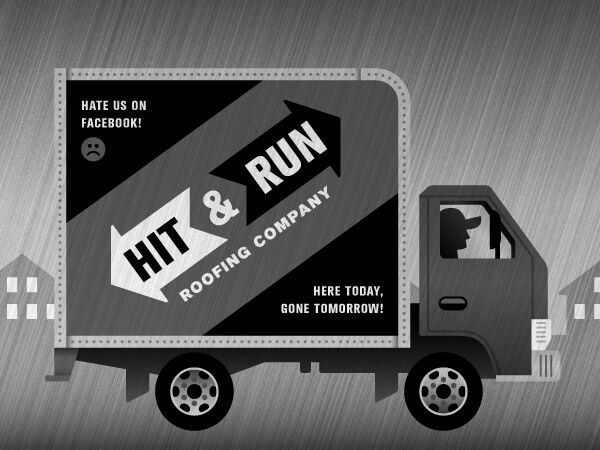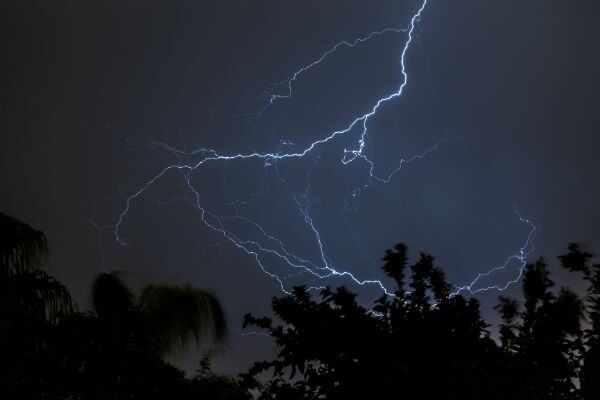Storm Chasers: How to Keep Them Off Your Roof
Published on Tuesday December 6, 2016The term storm chasers commonly refers to adventurers who insert themselves in severe weather situations for science or thrills. There’s a subset of professional roofers who have earned this title, as well — but their adventure is making fast money off of you and your neighbors.

What are Storm Chasers?
Storm chasers are roofing contractors who follow in the wake of severe weather incidents with hopes of doing a lot of repair work — and usually very quickly.
The m.o. of a storm chaser looks something like this:
- The contractor watches for severe weather to strike a region. “Severe weather” can mean anything from a hail storm to a tornado.
- Following the storm, the contractor rounds up a crew, travels to the affected area and begins to use aggressive tactics to drum up business that can range from annoying to shady to scary. The storm chaser offers to repair storm damage done to a homeowner’s roof at little or no cost to the homeowner.
- How is this possible? By encouraging homeowners to make use of their home insurance policies. Some storm chasers even offer to pay the homeowner’s deductible, or offer cash back!
- The storm chaser completes a rush job on the roof, and a few years later, it’s already beginning to fail; or, in some cases, storm chasers have been known to simply take the money and run.
A real-life storm chaser incident

One gentleman we spoke with — let’s call him Joe, because he asked for anonymity — said that shortly after a hail storm hit his Maryland neighborhood in May 2016, storm chasers came calling.
Several different storm-chasing companies had reps knocking on doors, offering to help residents get new roofs for free.
Joe told us that the storm chasers asked the homeowners if they wanted a new roof. Then, they asked about the size of the homeowner’s insurance deductible. They guaranteed the homeowners that insurance would pay for the new roof. Finally, they asked the homeowners to sign some papers.
A storm chaser employee climbed onto roofs in Joe’s neighborhood and circled damaged areas with neon orange paint. Signs went up in front yards that read, “Pre-approved by insurance for new roof.”
More than six months later, many of these homes still do not have the new roofs that were promised.
If it sounds too good to be true…
For many people — especially anxious homeowners whose roofs have been damaged, or homeowners who were convinced that their roofs were compromised by the recent storm — the idea of getting a brand new roof for free is appealing. A problem is solved, no (or very little) cash changes hands and you have a new roof. Everybody wins, right?
Wrong. As Mike LaFollette of Angi writes:
Storm chasers know how the insurance companies work, and based on the square footage of the roof, they can figure out how much it will cost to put on a cheap new roof. The homeowner gets burned because the storm chaser only does the bare minimum to replace the roof, but doesn’t address any other problems, or restore the roof to its original condition…The storm chasers have no incentive to produce high quality work, and there’s really no way for them to be held accountable because they will be gone by the time a problem arises.
Standing up to storm chasers

When confronted by a storm chaser who insists that your roof is damaged and can be fixed on the cheap, you need to stand your ground. Do you want to do some homework to see if the company is reputable (a history of positive online reviews, an updated website, licenses and certifications are up to date, available if future repairs are needed)?
Of course you do. Do not give the storm chaser any of your information or sign any papers.
A few things that homeowners should be considering when the chasers come calling:
- Can these contractors be trusted? Why? Because they seem so nice? Or because you’ve done real research? Make sure it’s the latter.
- Are they qualified to do the job? Are these roofers licensed and certified? How long has this company been in business? Are there references you can check?
- Will I be getting a quality product? What kind of materials do these roofers use? How much roofing experience does the contractor and crew have?
- Will this work carry a warranty? And will the company be around if you do have issues? Who do you call if you have a problem after you accept this new roof?
The Better Business Bureau and the Federal Trade Commission recognize the growing trend of storm chasing scams. Both organizations released notices in 2016 warning consumers about potential scams. A few points worth reiterating:
Don’t be pressured. Don’t sign anything.
Many storm chasers use high-pressure sales tactics to get you to sign agreements or let them onto your roof to perform an “inspection” — some homeowners have even suggested that there wasn’t roof damage before the storm chasers “examined” their roof.
One woman from a town in Virginia said that she made the mistake of signing a document from a storm chaser. When she decided she’d rather use a reputable company to do the work, the storm-chasing company began to harass and threaten her with litigation over the documentation.
State laws would have made these documents null and void because no money had been exchanged, but laws vary from state-to-state. And what would she have done if the storm chasers who visited her had used that orange spray paint on her roof?
Your safest bet is to call your insurance company first, and don’t let anyone on your roof in the meantime. The insurance company’s estimator will be able to validate any suspected damage, if it exists, and are the best first step in filing a claim.
Get a second opinion from a reputable local company.

Once your insurance company has validated damage and given you a quote, then (and only then) is it time to get estimates for the repair or replacement work that you need.
With a local company, you have the benefit of getting referrals. A local company has a reputation to uphold. You also have access to continued customer service — storm chasers may be here one day and gone the next.
Remember: a reputable company won’t drop by to do work that you haven’t requested. You make the first step: you call the reputable company, and you schedule an appointment. The company representative will look professional and show identification. You’ll have a chance to discuss the details of the damage, replacement options and any out of pocket costs to you.
A reputable company knows their product and local building codes. Their representatives will be able to explain the details of their labor and manufacturers’ warranties. They will give this information to you in writing.
A reputable company will be there to help you every step of the way during the process. Most importantly, the company will still be there if you need them tomorrow or years from now.
Do Your Homework!
Do your due diligence when choosing a roofing contractor. Check with local and state agencies to find out if your anticipated contractor is licensed and qualified to do the work.
A contractor from California may know nothing about hurricane straps used on the East Coast, just like a Maryland contractor may not know construction code for earthquake zones.
Consider Your Options.
Don’t underestimate the importance of quality labor and materials. If your “free estimate” is installed improperly, it could fail. If your roof fails because of improper installation, your manufacturer’s warranty can be nullified.
If you can’t get a hold of your out-of-state contractor to uphold the labor end of the warranty, who is going to make the necessary repairs? You could wind up paying more in the long run for a cheap roof you chose in the short term.
Don’t Give Anyone Money Until…
You’ve called your insurance company, done your homework and decided on a company you trust. Even then, make sure that you have everything in writing. Pay by check or credit card to have a record of transactions as work is performed.
Pro tip: a credit card transaction can be disputed as a billing error if you are charged for services that were not delivered as agreed. You can dispute the charge within the first 60 days of the first statement you receive with the charge. The creditor then has 90 days to resolve the dispute.
Most companies will discuss a payment schedule with you and give you the agreed-upon schedule in writing. You should never pay the full amount of a job up front! Be wary of contractors who pressure you into full payment before any work is done.
Not all storm chasers are sketchy — but it’s your responsibility to separate the good from the bad. Make sure you don’t end up as a sad story in your neighborhood.
Roof damage? Give us a call.
It’s no secret that we get rough weather on the East Coast. If you need a roof replacement, check with Long Roofing — a local roofing company you know and trust. When the next storm comes, you’ll have confidence that your home and family are safe. We build trust and peace of mind into every Long Roofing roof.
Contact Long Roofing online to schedule a free, in-home consultation or find answers to any home roofing questions. Ask us about our industry-leading 50-year roofing warranty.
Interested in Long Home Products?
See our special offers now.








